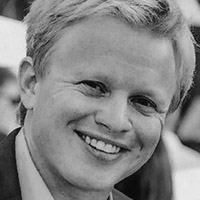TBILISI, Georgia — What is Russian President Vladimir Putin’s grand strategy? It may get lost in the headlines about the murder of an opposition leader just outside the Kremlin walls and the grinding horrors of the Ukraine war, but from the shores of the Black Sea here in Georgia the outlines are painfully obvious.
While the world’s attention has focused on eastern Ukraine over the last year, the Kremlin has been maneuvering to take something far more valuable than the war-torn sliver of outdated industrial territory known as Donbass around Luhansk and Donetsk.
There is a reason Putin has not agreed to annex parts of eastern Ukraine. It has nothing to do with sanctions, oil or respect for any country’s territorial sovereignty. Russia simply does not want to take on the long-term economic burden of the Donbass region and its people. Tearing up a country by sending in troops and weapons is far less expensive than putting one (and its broken economy) back together. Eastern Ukraine was not financially solvent (without cheap Russian fuel) to begin with. Annexation of this region, as many analysts have written, never was Putin’s intention. And he could not care less about the actual welfare those Ukrainian “Russians” who believe they are fighting in his name.
So the war in Ukraine will end exactly where it began: Crimea. Control of the Crimean Peninsula probably was the strategic goal of the Kremlin even before its tool, President Viktor Yanukovych, fled his ridiculous mansion. The war in the East has provided a convenient theater for Russia at relatively little cost. Yet convincing the world that Russia is a “mighty” international bogeyman—inspiring extremist right- and left-wing movements in neighborhoods near you—has only been a perk for Putin.
Control of Crimea wasn’t actually the end goal of the larger strategy. The objective all along has been control of the Black Sea region and the ability to monopolize energy supplies sent to Europe via that corridor. It seems so simple now. Unfortunately, we’re not talking in hypotheticals: The missiles already are in place and the oil pumps are primed.
Russia’s recent economic maneuvers in the Black Sea region have been largely overlooked. Last month my colleagues at Georgian Journal, where I have been acting as a managing editor, ran a revealing article headlined “Rosneft Deal Jeopardizes Georgia’s Strategic Energy Transit Corridor.”
In a baffling move, the Georgian government allowed 49 percent of its locally owned oil terminal in Poti—one of the few in the entire country—to be sold directly to Rosneft, Russia’s largest state-owned oil company. While owner David Iakobashvili, a murky figure who reportedly made a ton of cash off the deal, gloated at the World Economic Forum in Davos, boasting about the investment the deal would bring to Georgia, the rest of Tbilisi’s normally intractable and politically combustible political culture remained oddly silent.
As financial analyst Thomas Kapp put it in the journal article, “Monopolies do not stop at 49 percent. In exchange for a small amount of Russian investment, the Georgian government is allowing Russia to avoid Western sanctions by bringing fuel directly through Georgia in a move that will permanently result in Georgia’s national strategic detriment. Meanwhile, the Georgian government is talking about land plots for NATO training centers and making copious political claims about Western integration. The problem here is that actions speak louder than words. The irony is that those sanctions Georgia is now helping Russia circumvent were intended to protect countries like Ukraine and Georgia from Russian occupation and aggression. What’s even more unfortunate is that those ‘strategic partners’ of Georgia, like Germany and the Baltic states for instance, are paying a very heavy financial and political price to push those sanctions through.”
The Rosneft deal isn’t just about Georgia, says Kapp: “The oil behemoth has its eye on the entire trans-Caucasus region. Armenia, specifically, depends heavily on imports through Georgia’s Poti terminal, which is owned by Petrocas. Georgia is uniquely positioned to be a significant and influential energy corridor, not just a consumer.” The acquisition is extremely alarming and the Georgian government, supposedly a staunch U.S. ally, at best seems to be capitulating.
This deal brings the fighting in eastern Ukraine full circle and explains how an eventual land bridge to Crimea is Putin’s long-term goal. He will slowly and methodically make his way there in between the ceasefires. Putin has the entire Black Sea to gain. This is why the Kremlin is seeking not just economic dominance of the Black Sea corridor and energy transit routes but also military dominance as well.
Last week NATO Commander and Air Force General Philip Breedlove raised further concerns about the “transformation” of the Crimean peninsula and the anti-air and anti-surface missile systems being deployed to the peninsula. According to Breedlove, “These weapon systems—from air defense systems that reach nearly half of the Black Sea to surface attack systems that reach almost all of the Black Sea area—have made the platform of Crimea a great platform for power projection into this area.”
According to USNI News, Iskander mobile ballistic missile systems (NATO code name: SS-26 Stone) have been moved into Crimea. “The missiles are capable of being redirected in flight and could strike a moving ship.”
In essence the balance of power in the Black Sea has been tipping since the “little green men” first moved into the Crimean Peninsula. “Additionally,” says USNI News, “Russian signals intelligence ships have reportedly shadowed U.S. and NATO ships in the Black Sea and could reasonably provide highly accurate targeting information to land based missile systems.” Any country on the Black Sea is now a target along with any vessel deployed there.
Putin has kept his eyes on the prize, the Black Sea. What the rest of the world is doing, alas, is anybody’s guess.




